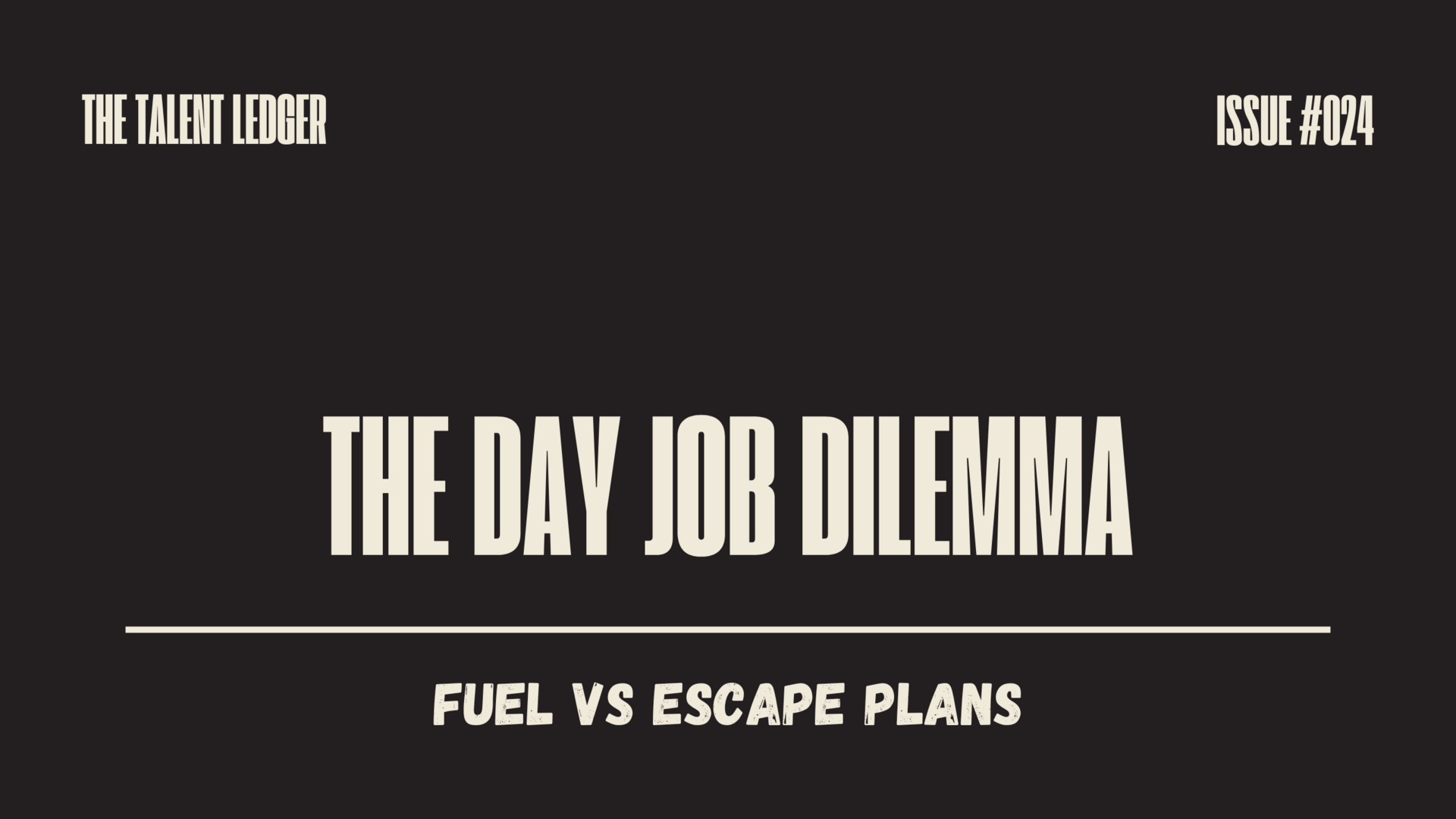- The Talent Ledger
- Posts
- The Day Job Dilemma
The Day Job Dilemma
Some side hustles fuel success, others signal escape plans


𝐖𝐞𝐞𝐤𝐥𝐲 𝐓𝐚𝐤𝐞
Most investors avoid part-time founders. Too risky. Not committed enough. But some of our best bets have been founders who kept their day jobs.
The difference isn't whether they have outside income. It's why they keep it.
I recently looked at two part-time founders building solid companies in good markets. Both had industry experience and financial runway. One used their stability as fuel for patient, deliberate progress. The other was clearly looking for any exit from their current situation.
Their contrast reveals when day jobs become competitive advantages versus warning signs.
𝐅𝐨𝐮𝐧𝐝𝐞𝐫 𝐏𝐫𝐨𝐟𝐢𝐥𝐞𝐬
Founder A | Founder B |
|---|---|
📅 Age: 50s | 📅 Age: 30s |
📍 Geography: Southeast | 📍 Geography: South |
📈 Stage: Prototype with recurring beta users | 📊 Stage: Alpha version with pilot users |
🧪 Industry: Consumer health products | 💼 Industry: B2B workflow software |
🎓 Background: Advanced degree with 20+ years industry experience | 🎓 Background: Mid-level product management at enterprise company |
🔥 X-Factor: Long-view mindset with zero urgency to scale fast | 💡 X-Factor: Domain familiarity with decent design capabilities |
𝐓𝐡𝐞 𝐃𝐨𝐰𝐧𝐥𝐨𝐚𝐝
𝐅𝐨𝐮𝐧𝐝𝐞𝐫 𝐀: 𝐘𝐞𝐬 ✅
This founder's consumer health product addressed an overlooked wellness category. The product wasn't flashy, but it showed clear founder-market fit.
What mattered was their approach. They showed zero urgency to scale unnecessarily fast and had high confidence in steady growth. Their deep industry background provided both product expertise and realistic timelines.
This founder knew exactly who the product was for, why it worked, and how to make money from it. They'd completed initial testing with recurring users who validated core assumptions.
Most importantly, they'd keep building with or without us. No fantasies of overnight success - just a grounded operator building something real with clear advantages.
Deep expertise paired with patient execution made this a yes.
𝐅𝐨𝐮𝐧𝐝𝐞𝐫 𝐁: 𝐍𝐨 ❌
This founder's B2B workflow tool addressed real pain points in an underserved market. Their domain experience provided insight into specific operational challenges that larger solutions missed.
What initially looked good was a tool that solved genuine problems in a neglected space. The founder understood the pain points from direct experience and had solid design skills.
But their energy felt more like someone seeking an escape route than a founder chasing a mission. We didn't believe they'd stick with it when things got difficult.
Their go-to-market approach lacked clarity, and they hadn't shown the commitment necessary to push through obstacles. The motivation seemed focused on finding a way out of their current job rather than building something meaningful.
Without proof of real commitment or a clear plan to persevere, the abandonment risk was too high - and this is why I said no.
𝐌𝐲 𝐑𝐮𝐛𝐫𝐢𝐤
𝐀 𝐯𝐢𝐬𝐮𝐚𝐥 𝐛𝐫𝐞𝐚𝐤𝐝𝐨𝐰𝐧 𝐨𝐟 𝐤𝐞𝐲 𝐟𝐚𝐜𝐭𝐨𝐫𝐬 𝐢𝐧 𝐦𝐲 𝐢𝐧𝐯𝐞𝐬𝐭𝐦𝐞𝐧𝐭 𝐝𝐞𝐜𝐢𝐬𝐢𝐨𝐧

This comparison shows how underlying motivation matters more than surface-level similarities in part-time founding approaches.
𝐄𝐧𝐠𝐚𝐠𝐞𝐦𝐞𝐧𝐭 𝐂𝐨𝐫𝐧𝐞𝐫
𝐐: 𝐇𝐨𝐰 𝐝𝐨 𝐲𝐨𝐮 𝐞𝐯𝐚𝐥𝐮𝐚𝐭𝐞 𝐟𝐨𝐮𝐧𝐝𝐞𝐫 𝐜𝐨𝐦𝐦𝐢𝐭𝐦𝐞𝐧𝐭 𝐢𝐧 𝐩𝐚𝐫𝐭-𝐭𝐢𝐦𝐞 𝐯𝐞𝐧𝐭𝐮𝐫𝐞𝐬?
Commitment shows up in small signals, not big declarations. Look for founders who ship consistently despite limited time, seek feedback actively, and show patient progress over quick wins.
The best part-time founders treat their day jobs as advantages - providing stability, industry insight, or customer access rather than something to escape. They're building toward something specific, not away from something they dislike.
Ask direct questions about their timeline and persistence plans. Founders who've thought through difficult periods and have realistic expectations stick with it longer than those seeking immediate validation.
𝐒𝐡𝐚𝐫𝐞 𝐓𝐡𝐞 𝐓𝐚𝐥𝐞𝐧𝐭 𝐋𝐞𝐝𝐠𝐞𝐫
Refer a founder → Get direct access to Will for strategic advice.
Get unfiltered advice on overcoming founder challenges
Ask about investment reality and what's actually working
Dive deeper into any Talent Ledger topic that resonated with you

You currently have 0 referrals, only 1 away from receiving a 15-Minute Strategy Session with Will Stringer.
Or copy & paste this link.
𝐂𝐥𝐨𝐬𝐢𝐧𝐠 𝐓𝐡𝐨𝐮𝐠𝐡𝐭𝐬
Having a day job isn't a disqualifier - the motivation behind keeping it determines everything. Some founders use stability as fuel for deliberate progress. Others use ventures as escape hatches.
The difference shows up in commitment signals: shipping speed, user feedback cycles, and timeline planning. The best part-time founders aren't looking for quick exits.
The ledger entry is clear: bet on fuel, not escape plans.
Auditing more talent next week,
Will Stringer

𝐅𝐞𝐞𝐝𝐛𝐚𝐜𝐤
Did you enjoy this issue?Your feedback will be used to refine this newsletter. |
P.S. If you found value in this entry, add it to someone else's ledger by forwarding this email. If you're that someone, subscribe here to get inside access to how I invest in exceptional people.